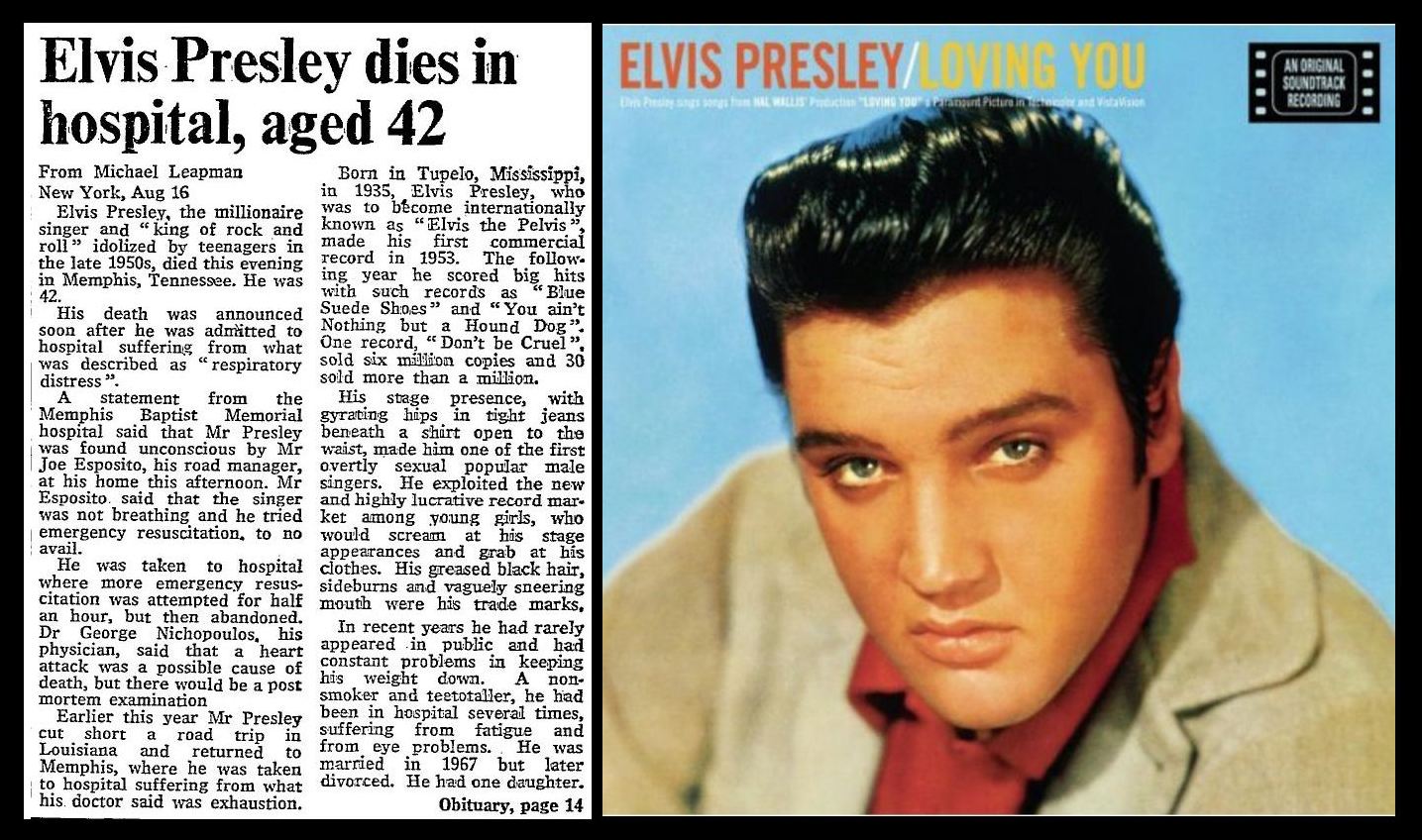
Elvis Presley died today, all over again.
Streets were blocked off around Graceland, and from five yesterday until three or so this morning, thousands of people walked slowly to his grave, holding candles, often weeping, their vigil more loyal than the apostles’ at Gethsemane. Fans placed homemade memorials outside the gates or added flowers to the masses on his grave. Every year they come, mourning the early and tragic death of a man they keep alive in their hearts for the other three hundred sixty-four days.
For a while, many swore he was alive. He had faked his death to escape their love, the burden of which they freely acknowledged. Now that he is, someplace, eighty-seven years old, that notion has faded. But it is easy to understand why the theories once flew. Forty-five years ago, Elvis was fine—if you do not count the fourteen drugs a toxicology report later recorded in his system, and the bloated body and scattered mind of a man who had lost his edge or had it stolen, and was zipping what was left of himself into too-shiny jumpsuits. Death hardly seemed imminent, and when it struck, both Elvises had to be protected from its rude facts: the sad boy-man we loved because he needed us and the extraordinary talent we enthroned as a king.
He was pronounced dead at 3:30 p.m. today forty-five years ago. Memphis political reporter Jackson Baker, who had grown up near Elvis’s pre-Graceland home and watched his rise with wide eyes, wrote a tribute for Memphis Magazine, the presses held until he finished. In that piece, Baker wrote that Elvis “had apparently fallen out of the black lounging chair where he had been reading.” Only later would we learn that he had risen from a different, porcelain throne, an unhappy reminder that he was as human, all along, as the rest of us. Initial reports assured fans that Elvis took only a few pills for sensible medical reasons; only later did the toxicology report show us what he had done to his mind and his body. An autopsy was done, but Elvis’s father insisted that the results not be made public. The cause of death was labeled simply “cardiac arrhythmia,” which seemed too slight to kill a king. Surely only a lightning bolt, hurled from the skies, could have done it?
His name was misspelled in the inscription in the Meditation Garden, a place he created at Graceland to get a little peace and quiet. His body was moved there when hordes of fans trampled the Forest Hill Cemetery. Who would or could misspell his name? He was Elvis Aron Presley, not Aaron, and Vernon Elvis Presley surely knew his son’s name better than his own veined hand. Ergo, the misspelling had to be a sign. A message, a wink.
“Everybody’s got stories,” says Jeff Zepatos, fourth-generation owner of the Arcade Diner, est. 1919. “This guy will swear up and down his sister broke into where the body was being stored and it was a wax statue.” (One had been ordered, for undeclared purposes, which only fanned the imagination.) A woman dug into what medical information she could find and wrote a book declaring that it did not hold up to scrutiny. Elvis started showing up at grocery stores, in cinnamon buns, on city streets—and then in a thousand songs that spoke his name. Wishful thinking, all of it. Fifteen years later, the Presley Commission would form to investigate the possibility; after three years’ work, the commission published a shrug of a report that left just enough doubt to keep the theories alive. The report, along with 2,915 pages of FBI documents, went to the Elvis Is Alive Museum that had opened in Wright City, Missouri.
Five years from now, the autopsy report that Vernon Presley had sealed for fifty years will be released. Forty-five years ago, fifty thousand grief-stricken people gathered outside Graceland. They were in shock, and had not yet started to imagine alternatives. By dusk, a long line of cars was inching past the mansion in both directions, headlights glowing through what was left of daylight. Others gathered outside the gates and stayed all night. A teenage driver lost control and spun into the crowd, killing two young women who had come from Monroe, Louisiana, to pay their respects. A man died of a heart attack. As the August heat set in on Wednesday, women turned clammy with heat stroke or collapsed from overheated grief. One went into labor.
City police came to keep order, along with sheriff’s deputies and Air National Guardsmen. Reporters flew in from all over the world. Somebody noticed that he had died two days after his mother’s death anniversary. Two days after the day he lost the pure, grounding, unconditional love that had persuaded him he was special. The love that he, Velcroed with adoring women but still lonely, pacing with nerves, numbed by drugs, would never manage to replace.
John Pareles, music critic for The New York Times, wrote that “strangely enough, anniversaries of his death are celebrated more fervently than his birthday, January 8, 1935.” Maybe January is too chilly for such a warm and sweaty outpouring of love. Or maybe the death, too soon and too sad, is what gave us back our Elvis, young again, and pretty, sure of his momma’s love and his own purpose, throwing us his scarves and making us swoon.
Read more by Jeannette Cooperman here.
